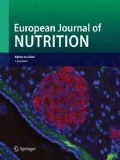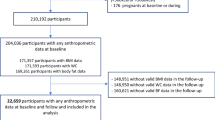Abstract
Purpose
The association between dietary protein intake and type 2 diabetes risk has been inconsistent in the previous epidemiological studies. We aimed to quantitatively assess whether dietary total, animal, and plant protein would be associated with type 2 diabetes risk.
Methods
A comprehensive literature review was conducted to identify related articles by searching PubMed, Embase, Web of Science, and Wiley Online Library through 20th March 2018. Generalized least squares for trend estimation and restricted cubic spline regression model were applied in the dose–response analysis.
Results
Eight publications with ten prospective cohorts of 34,221 type 2 diabetes cases were included. After adjustment of potential confounders, a 5% of energy increment from dietary total and animal protein intake was related to a 9% (1.04, 1.13; I2 = 42.0%) and 12% (95% CI 1.08, 1.17; I2 = 14.0%) higher risk of type 2 diabetes respectively. However, for plant protein, a significant U-shaped curve was observed with the most risk reduction at intake of about 6% of energy intake from plant protein intake (Pnonlinearity = 0.001). The results were robust in sensitivity analysis and no publication bias was detected.
Conclusions
These findings indicate that the consumption of protein particularly animal protein may be associated with an increased risk of type 2 diabetes.



Similar content being viewed by others
Abbreviations
- T2D:
-
Type 2 diabetes
- RR:
-
Relative risks
- CIs:
-
Confidence intervals
- BMI:
-
Body mass index
References
World Health Organization (2016) Global report on diabetes. World Health Organization, Geneva
Gregg EW, Sattar N, Ali MK (2016) The changing face of diabetes complications. Lancet Diabetes Endocrinol 4:537–547. https://doi.org/10.1016/s2213-8587(16)30010-9
Promintzer M, Krebs M (2006) Effects of dietary protein on glucose homeostasis. Curr Opin Clin Nutr Metab Care 9:463–468. https://doi.org/10.1097/01.mco.0000232909.84483.a9
Rietman A, Schwarz J, Tome D, Kok FJ, Mensink M (2014) High dietary protein intake, reducing or eliciting insulin resistance? Eur J Clin Nutr 68:973–979. https://doi.org/10.1038/ejcn.2014.123
Westerterp-Plantenga MS, Nieuwenhuizen A, Tome D, Soenen S, Westerterp KR (2009) Dietary protein, weight loss, and weight maintenance. Annu Rev Nutr 29:21–41. https://doi.org/10.1146/annurev-nutr-080508-141056
Pan A, Sun Q, Bernstein AM, Schulze MB, Manson JE, Willett WC, Hu FB (2011) Red meat consumption and risk of type 2 diabetes: 3 cohorts of US adults and an updated meta-analysis. Am J Clin Nutr 94:1088–1096. https://doi.org/10.3945/ajcn.111.018978
Bendinelli B, Palli D, Masala G, Sharp SJ, Schulze MB, Guevara M, van der AD, Sera F, Amiano P, Balkau B, Barricarte A, Boeing H, Crowe FL, Dahm CC, Dalmeijer G, de Lauzon-Guillain B, Egeberg R, Fagherazzi G, Franks PW, Krogh V, Huerta JM, Jakszyn P, Khaw KT, Li K, Mattiello A, Nilsson PM, Overvad K, Ricceri F, Rolandsson O, Sanchez MJ, Slimani N, Sluijs I, Spijkerman AM, Teucher B, Tjonneland A, Tumino R, van den Berg SW, Forouhi NG, Langeberg C, Feskens EJ, Riboli E, Wareham NJ (2013) Association between dietary meat consumption and incident type 2 diabetes: the EPIC-InterAct study. Diabetologia 56:47–59. https://doi.org/10.1007/s00125-012-2718-7
Afshin A, Micha R, Khatibzadeh S, Mozaffarian D (2014) Consumption of nuts and legumes and risk of incident ischemic heart disease, stroke, and diabetes: a systematic review and meta-analysis. Am J Clin Nutr 100:278–288. https://doi.org/10.3945/ajcn.113.076901
Nanri A, Mizoue T, Takahashi Y, Kirii K, Inoue M, Noda M, Tsugane S (2010) Soy product and isoflavone intakes are associated with a lower risk of type 2 diabetes in overweight Japanese women. J Nutr 140:580–586. https://doi.org/10.3945/jn.109.116020
Sluijs I, Beulens JW, van der AD, Spijkerman AM, Grobbee DE, van der Schouw YT (2010) Dietary intake of total, animal, and vegetable protein and risk of type 2 diabetes in the European Prospective Investigation into Cancer and Nutrition (EPIC)-NL study. Diabetes Care 33:43–48. https://doi.org/10.2337/dc09-1321
Wang ET, De Koning L, Kanaya AM (2010) Higher protein intake is associated with diabetes risk in South Asian Indians: the metabolic syndrome and atherosclerosis in South Asians Living in America (MASALA) study. J Am Coll Nutr 29:130–135
Ericson U, Sonestedt E, Gullberg B, Hellstrand S, Hindy G, Wirfalt E, Orho-Melander M (2013) High intakes of protein and processed meat associate with increased incidence of type 2 diabetes. Br J Nutr 109:1143–1153. https://doi.org/10.1017/S0007114512003017
Nielen M, Feskens EJM, Mensink M, Sluijs I, Molina E, Amiano P, Ardanaz E, Balkau B, Beulens JWJ, Boeing H, Clavel-Chapelon F, Fagherazzi G, Franks PW, Halkjaer J, Huerta JM, Katzke V, Key TJ, Khaw KT, Krogh V, Kuhn T, Menendez VVM, Nilsson P, Overvad K, Palli D, Panico S, Rolandsson O, Romieu I, Sacerdote C, Sanchez MJ, Schulze MB, Spijkerman AMW, Tjonneland A, Tumino R, A DL, Wurtz AML, Zamora-Ros R, Langenberg C, Sharp SJ, Forouhi NG, Riboli E, Wareham NJ (2014) Dietary protein intake and incidence of type 2 diabetes in Europe: the EPIC-InterAct case-cohort study. Diabetes Care 37:1854–1862. https://doi.org/10.2337/dc13-2627
Malik VS, Li Y, Tobias DK, Pan A, Hu FB (2016) Dietary protein intake and risk of type 2 diabetes in US men and women. Am J Epidemiol 183:715–728. https://doi.org/10.1093/aje/kwv268
Shamseer L, Moher D, Clarke M, Ghersi D, Liberati A, Petticrew M, Shekelle P, Stewart LA, Group P-P (2015) Preferred reporting items for systematic review and meta-analysis protocols (PRISMA-P) 2015: elaboration and explanation. BMJ 349:g7647. https://doi.org/10.1136/bmj.g7647 (Clinical research ed.)
Wells GA, Shea B, O’Connell D, Peterson J, Welch V, Losos M, Tugwell P The Newcastle–Ottawa Scale (NOS) for assessing the quality of nonrandomised studies in meta-analyses. http://www.ohri.ca/programs/clinical_epidemiology/oxford.asp. Accessed 11 Nov 2017
DerSimonian R, Laird N (2015) Meta-analysis in clinical trials revisited. Contemp Clin Trials 45:139–145. https://doi.org/10.1016/j.cct.2015.09.002
Greenland S, Longnecker MP (1992) Methods for trend estimation from summarized dose–response data, with applications to meta-analysis. Am J Epidemiol 135:1301–1309
Orsini N, Li R, Wolk A, Khudyakov P, Spiegelman D (2012) Meta-analysis for linear and nonlinear dose-response relations: examples, an evaluation of approximations, and software. Am J Epidemiol 175:66–73. https://doi.org/10.1093/aje/kwr265
Orsini N, Bellocco R, Greenland S (2006) Generalized least squares for trend estimation of summarized dose–response data. Stata J 6:40–57
Jackson D, White IR, Thompson SG (2010) Extending DerSimonian and Laird’s methodology to perform multivariate random effects meta-analyses. Stat Med 29:1282–1297. https://doi.org/10.1002/sim.3602
Desquilbet L, Mariotti F (2010) Dose-response analyses using restricted cubic spline functions in public health research. Stat Med 29:1037–1057. https://doi.org/10.1002/sim.3841
Higgins JP, Thompson SG (2002) Quantifying heterogeneity in a meta-analysis. Stat Med 21:1539–1558. https://doi.org/10.1002/sim.1186
Egger M, Davey Smith G, Schneider M, Minder C (1997) Bias in meta-analysis detected by a simple, graphical test. BMJ 315:629–634
Song Y, Buring JE, Manson JE, Liu SM (2004) A prospective study of red meat consumption and type 2 diabetes in middle-aged and elderly women. Diabetes Care 27:2108–2115. https://doi.org/10.2337/diacare.27.9.2108
Tinker LF, Sarto GE, Howard BV, Huang Y, Neuhouser ML, Mossavar-Rahmani Y, Beasley JM, Margolis KL, Eaton CB, Phillips LS, Prentice RL (2011) Biomarker-calibrated dietary energy and protein intake associations with diabetes risk among postmenopausal women from the Women’s Health Initiative. Am J Clin Nutr 94:1600–1606. https://doi.org/10.3945/ajcn.111.018648
Alhazmi A, Stojanovski E, McEvoy M, Garg ML (2014) Macronutrient intake and type 2 diabetes risk in middle-aged Australian women. Results from the Australian Longitudinal Study on Women’s Health. Public health Nutr 17:1587–1594. https://doi.org/10.1017/s1368980013001870
Shang X, Scott D, Hodge AM, English DR, Giles GG, Ebeling PR, Sanders KM (2016) Dietary protein intake and risk of type 2 diabetes: results from the Melbourne Collaborative Cohort Study and a meta-analysis of prospective studies. Am J Clin Nutr 104:1352–1365. https://doi.org/10.3945/ajcn.116.140954
Virtanen HEK, Koskinen TT, Voutilainen S, Mursu J, Tuomainen TP, Kokko P, Virtanen JK (2017) Intake of different dietary proteins and risk of type 2 diabetes in men: the Kuopio Ischaemic Heart Disease Risk Factor Study. Br J Nutr 117:882–893. https://doi.org/10.1017/S0007114517000745
Nanri A, Mizoue T, Kurotani K, Goto A, Oba S, Noda M, Sawada N, Tsugane S (2015) Low-carbohydrate diet and type 2 diabetes risk in Japanese men and women: the Japan Public Health Center-Based Prospective Study. PLoS One 10:e0118377. https://doi.org/10.1371/journal.pone.0118377
Van Nielen M, Feskens E, Mensink M, Forouhi N, Wareham N (2013) Dietary protein intake and the incidence of type 2 diabetes in Europe: the epic-interact case-cohort study. Ann Nutr Metab 63:201
Virtanen HEK, Koskinen TT, Voutilainen S, Mursu J, Tuomainen T-P, Kokko P, Virtanen JK (2017) Intake of different dietary proteins and risk of type 2 diabetes in men: the Kuopio Ischaemic Heart Disease Risk Factor Study. Br J Nutr. https://doi.org/10.1017/s0007114517000745
Koloverou E, Esposito K, Giugliano D, Panagiotakos D (2014) The effect of Mediterranean diet on the development of type 2 diabetes mellitus: a meta-analysis of 10 prospective studies and 136,846 participants. Metab Clin Exp 63:903–911. https://doi.org/10.1016/j.metabol.2014.04.010
McEvoy CT, Cardwell CR, Woodside JV, Young IS, Hunter SJ, McKinley MC (2014) A posteriori dietary patterns are related to risk of type 2 diabetes: findings from a systematic review and meta-analysis. J Acad Nutr Diet 114:1759–1775 e1754. https://doi.org/10.1016/j.jand.2014.05.001
Neu A, Behret F, Braun R, Herrlich S, Liebrich F, Loesch-Binder M, Schneider A, Schweizer R (2015) Higher glucose concentrations following protein- and fat-rich meals—the Tuebingen Grill Study: a pilot study in adolescents with type 1 diabetes. Pediatr Diabetes 16:587–591. https://doi.org/10.1111/pedi.12224
Tremblay F, Lavigne C, Jacques H, Marette A (2007) Role of dietary proteins and amino acids in the pathogenesis of insulin resistance. Annu Rev Nutr 27:293–310. https://doi.org/10.1146/annurev.nutr.25.050304.092545
Wang TJ, Larson MG, Vasan RS, Cheng S, Rhee EP, McCabe E, Lewis GD, Fox CS, Jacques PF, Fernandez C, O’Donnell CJ, Carr SA, Mootha VK, Florez JC, Souza A, Melander O, Clish CB, Gerszten RE (2011) Metabolite profiles and the risk of developing diabetes. Nat Med 17:448–453. https://doi.org/10.1038/nm.2307
Floegel A, Stefan N, Yu Z, Muhlenbruch K, Drogan D, Joost HG, Fritsche A, Haring HU, Hrabe de Angelis M, Peters A, Roden M, Prehn C, Wang-Sattler R, Illig T, Schulze MB, Adamski J, Boeing H, Pischon T (2013) Identification of serum metabolites associated with risk of type 2 diabetes using a targeted metabolomic approach. Diabetes 62:639–648. https://doi.org/10.2337/db12-0495
Adeva MM, Calvino J, Souto G, Donapetry C (2012) Insulin resistance and the metabolism of branched-chain amino acids in humans. Amino Acids 43:171–181. https://doi.org/10.1007/s00726-011-1088-7
Bantle JP, Wylie-Rosett J, Albright AL, Apovian CM, Clark NG, Franz MJ, Hoogwerf BJ, Lichtenstein AH, Mayer-Davis E, Mooradian AD, Wheeler ML (2008) Nutrition recommendations and interventions for diabetes: a position statement of the American Diabetes Association. Diabetes Care 31(Suppl 1):S61–78. https://doi.org/10.2337/dc08-S061
Song M, Fung TT, Hu FB, Willett WC, Longo VD, Chan AT, Giovannucci EL (2016) Association of animal and plant protein intake with all-cause and cause-specific mortality. JAMA Intern Med. https://doi.org/10.1001/jamainternmed.2016.4182
Chen X, Wei G, Jalili T, Metos J, Giri A, Cho ME, Boucher R, Greene T, Beddhu S (2016) The associations of plant protein intake with all-cause mortality in CKD. Am J Kidney Dis Off J Natl Kidney Found 67:423–430. https://doi.org/10.1053/j.ajkd.2015.10.018
Alhazmi A, Stojanovski E, McEvoy M, Garg ML (2012) Macronutrient intakes and development of type 2 diabetes: a systematic review and meta-analysis of cohort studies. J Am Coll Nutr 31:243–258
Acknowledgements
We would like to thank the original studies for the contribution to conduct our meta-analysis.
Funding
This work was supported by funds from the State Key Laboratory of Oncogenes and Related Genes (#91-15-10).
Author information
Authors and Affiliations
Contributions
Y-BX obtained the funding, conducted the research design, interpreted the results, and also had primary responsibility for the final content. L-GZ and Q-LZ analyzed the data and interpreted the results. L-GZ and Q-LZ drafted first manuscript. All authors critically reviewed and approved the manuscript. No authors have any conflicts of interest to declare.
Corresponding author
Ethics declarations
Conflict of interest
The authors declare no competing financial interests.
Electronic supplementary material
Below is the link to the electronic supplementary material.
Rights and permissions
About this article
Cite this article
Zhao, LG., Zhang, QL., Liu, XL. et al. Dietary protein intake and risk of type 2 diabetes: a dose–response meta-analysis of prospective studies. Eur J Nutr 58, 1351–1367 (2019). https://doi.org/10.1007/s00394-018-1737-7
Received:
Accepted:
Published:
Issue Date:
DOI: https://doi.org/10.1007/s00394-018-1737-7




